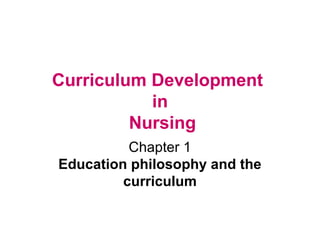
Nursing ppt ch.1 2015
- 1. Curriculum Development in Nursing Chapter 1 Education philosophy and the curriculum
- 2. Curriculum refers to planned - • learning experiences that the educational institution intends to .provide for its learners This definition does not deny the - • existence of hidden and null curricula (that which the educational institution chooses to exclude from its curriculum .
- 3. Some authors believe that education - • should be directed towards helping learners become intelligent and critical citizens in a democratic society (.(Dewey, 1916, 1961 A philosophy of education represents - • choices, values, knowledge and beliefs of teachers as well as their aspirations, .intentions and aims
- 4. At the heart of purposeful activity in - • curriculum development is an educational philosophy that assists in answering value-laden questions and selecting from among the many ’choices
- 5. Choices and decisions about - • curriculum are, hopefully, not random choices, but are based on thorough understanding of the educational .ideologies on which they are based
- 6. Three broad streams of educational - • philosophy underpin curricula choices ; and decisions , the conservative-1 • the progressive and-2 • .the radical views-3 •
- 7. The conservative view The purpose of education is to transmit • worthwhile bodies of information to generations of learners to be .conserved
- 8. Regulatory nursing organizations - • implicitly or explicitly continue to demand clear indications of how much medical nursing, surgical nursing, paediatric nursing or obstetric and gynaecological nursing a prospective practising nurse has been exposed to during her/his period of education and .training
- 9. The purpose of education • The purpose of education, from the • essentialists’ perspective, is the preservation, through transmission to generations of learners, of that which is .essential to learn
- 10. The goal of education is to instil in - • learners the academic and moral knowledge which should constitute those ‘essential things that a mature adult needs to know in order to be a ’productive member of society
- 11. Nature and role of the learner From the essentialist perspective, the learner is seen • as a passive recipient of information transmitted by disciplinary experts. The learner’s role is not to reason why, but to do as told. The interests and needs of the learner are seen as irrelevant to the educative process. What is important, though, is the conviction that learners differ greatly in their mental capabilities, and that it is not the function of the education system or the school to provide what the learner’s genes have failed to provide. Hence the emphasis on ability grouping and testing to weed .out those who can from those who just can’t
- 12. Nature and role of the teacher The teacher knows best. The teacher is an • expert with a wealth of information which he/she must transmit to the learner. It is therefore his/her duty to ensure that all that is essential to learn is taught. The teacher is charged with the responsibility to identify, select and organize that which is to be learned, and to decide how and when it is to .be learned
- 13. The nature of the teaching/learning process For the essentialists, learning is no more than - • acquisition of knowledge and skills. According to this perspective this acquisition is best achieved through a teaching/learning process that places emphasis on lectures, drill, recitation and demonstration, provided and led by an expert in the discipline. Mastery has to be demonstrated through performance in various forms of assessment. In fact essentialists are credited for the proliferation of standardized tests and assessment in the USA ((Tanner and Tanner, 1995
- 14. The progressive view Progressivism is associated with the - • rise in dissatisfaction with traditional education practices which placed emphasis on content and totally disregarded the place of learners’ needs and interest in education. Two streams of progressive education are evident in the educational philosophy .literature
- 15. John Dewey, a prominent and prolific - • writer in educational philosophy, is often referred to as the father of progressive education in the USA. Dewey’s philosophy of education is often called pragmatism or .experimentalism
- 16. From this perspective, education should not - • be isolated from its social context, because education and experience are inextricably intertwined. Education therefore, must focus on the learner’s experiences and interests rather than on predetermined bodies of knowledge. This does not mean that content has no place in education, but rather that the learner’s experience must be used to .mediate knowledge
- 17. Experimentalism Broad presuppositions underpinning - • :experimentalism include the following the meaning and value of ideas is only found • in practical results ideas must always be tested by • experimentation change is the only constant in human • existence the ability to adjust to and/or deal with • change is fundamental to constructive and (.democratic living (Tanner and Tanner, 1995